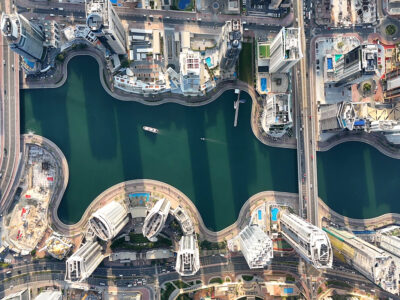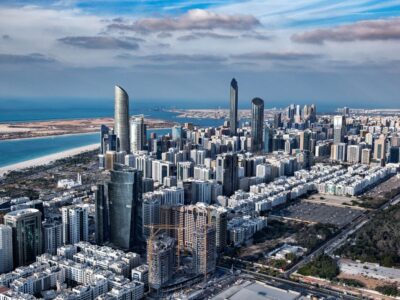|~|report2.jpg|~|Dowling: Emirates Glass is one of the major players in the local industry.|~|Demand for this particular man-made product has never been higher. It can be recycled easily, it is cost-effective and very eco-friendly. It can be used several times without losing its quality, and special types can be manufactured specifically to minimise air-conditioning costs and conserve energy. And it is as vital as any other product or material used in the construction of residential and commercial buildings.
It will come as no surprise then that the stock of the glass sector in the Gulf has never been higher. For those who manufacture it, design it, or supply it, glass now equates to big business. And firms have prepared themselves for the good times, which look set to continue for years.
Ali & Sons Company, one of the largest conglomerates in Abu Dhabi, is spending US $16.5 million (AED45 million) on a new glass manufacturing factory in the city’s industrial area.
On completion in mid-2007, the new Spectrum Glass Factory will begin operations at a capacity of 400,000m2, before the plant doubles capacity in 2009 to 800,000m2. More than 35 technical staff will operate the new processing facility, which will manufacture architectural glass covering these main process areas: cutting line, grinding, drilling and washing, screen printing and roller printing, tempering, heat strengthening and heat soak tests, double glazing and laminating.
“Spectrum Glass Factory will provide new, value-added and competitive products to the architectural and decorative glass market in the UAE. It will benefit from the ongoing construction boom in the UAE and the GCC region as a whole,” says Shames Al Dhahry, managing director, Ali & Sons.
“Our aim is to adopt global standards to meet all glass requirements in the region. Therefore, we will continue to invest substantial amounts of money to ensure higher level of quality and service required within the industry.”
The primary objective of the plant is to support the local market by supplying glass products for the architectural segment. It will then cater to more complex architectural needs through a myriad of sophisticated and innovative designs, large product sizes and combinations of production processes.
Al Abbar Architectural Glass has also announced a multi-million dollar investment plan as part of its aim to become the region’s leading architectural glass supplier. New tempering and cutting lines will be introduced at the company’s Dubai-based factory by October, while a new glass coating line will follow in March 2007.
Rashid Al Abbar, chairman, Al Abbar Group, says: “A vibrant economy, population growth, and an increased focus on tourism have all fuelled the need for a constantly expanding infrastructure; accelerating the growth of the construction industry, and providing an increased demand for architectural glass — not just in the UAE, but also across the region.
“Our new offering, combined with the increasingly global nature of the glass industry, will allow Al Abbar Architectural Glass to not only increase production capacity and product lines, but also expand its geographical operations to serve customers outside the Middle East.”
The introduction of Glaverbel Stopray technology will allow Al Abbar Architectural Glass to start producing sophisticated solar and energy control coatings which have, to date, been unavailable in the region. This will help to meet the stringent local building regulations and increasingly demanding specifications.
Emirates Glass is one of the biggest beneficiaries of the current explosion in the glass industry having doubled production capacity year-on-year for the past four years.
At present it coats 800,000m2 of glass a year for construction projects, and supplies a very high proportion of the tower developments in the UAE.
Established just eight years ago by Dubai Investments, Emirates Glass has now firmly secured its position as one of the leading providers of energy efficient architectural glass in the Middle East. Widely consulted by property developers, architects, engineers and contractors as to what high performance glass would best suit a particular project is testament to how far it has come in such a short space of time.
Prestigious contracts on some of the biggest developments in the UAE are now the norm for Emirates Glass. In August 2005 it won a contract to supply 56,000m2 of high-performance glass to Concourse Two, of the Dubai International Airport’s expansion project.
Gerry Dowling, general manager, Emirates Glass, admits: “It is probably one of the most challenging glazing tasks in the world today, considering the shape of the complex structure and glass specifications.
“However, Emirates Glass is one of the few companies capable of carrying out a project of such complexity. The technical know-how and the company’s track record in completing major projects will ensure smooth execution of this mission.”
Expected to be completed any time now, Emirates Glass was an easy choice for the client as its products are highly suitable for the stringent requirements of airport buildings.
Its experience on airport jobs — Emirates Glass has previously supplied Concourse One at Dubai International Airport and to a major extension at Changi Airport in Singapore — would have also helped. Last November, it also won a major contract to supply 140,000m2 of its premium glass to the Palm Jumeirah project.
The company delivered its EmiCool Sun Gray/Bronze glass to the development by the end of that month, with the supply contract executed within four months.
“This was made possible by the state-of-the-art machinery and equipment installed at our facility at a cost of more than $4.3 million,” says Dowling.||**|||~||~||~|However, increased demand for glass isn’t just concentrated in the Emirates, if contracts won by Emirates Glass are any kind of indication. It has been awarded deals to supply more than 67,000m2 of glass to 10 important regional developments — 42,000m2 for seven projects in Kuwait and 25,000m2 for three more in Qatar.
Emirates Glass has also expanded its distribution network by appointing new agents in Iraq, Bangladesh, Jordan and Iran and has already delivered glass to these areas, as well as the UK and Singapore. The selection of glass is vital due to its ability to permit heat into buildings. In terms of its thermal insulating properties, glass is very weak compared to concrete and rockwool. Allowing light to pass through also introduces heat, so glass windows are by far the principal source of heat in a typical building. However, there are solutions to that problem.
Over the past 25 years, technology has developed different varieties of glass that have thin, transparent metal films on them to cut, sometimes very substantially, the transmission of solar energy, and also to reduce the amount of conducted heat passing through the building. These include pyrolitic solar control glass, which offers a successful solution to the heat-gain problem within a specific range of limitations and advantages in performance and appearance, while pyrolitic coated glass functions well in terms of solar shading and thermal insulation.
Sputtered high performance glass is locally manufactured in the UAE and offers a superior range of colours, light transmissions, solar shading resistance and thermal insulation.
And sputter-coated glass offers the optimum solution to solar control in the Gulf environment and is also responsible for many of the coloured façades of buildings seen in the UAE.
With temperatures during the summers in the UAE reaching 50OC, the removal of excess heat in buildings is vital.
And with experts predicting that air conditioning amounts to around 30% of the total cost of a typical Dubai high-rise commercial building over the life of the building, property developers are now looking at other factors such as the architectural design of the building and the materials used in its construction to achieve savings.
Choosing the right type and characteristic of the glass and windows used in buildings across the Gulf is also a telling factor in keeping profits high.
With so many types of glass available and so many experts on hand to offer advice, making that correct choice couldn’t be simpler right now.
||**||







